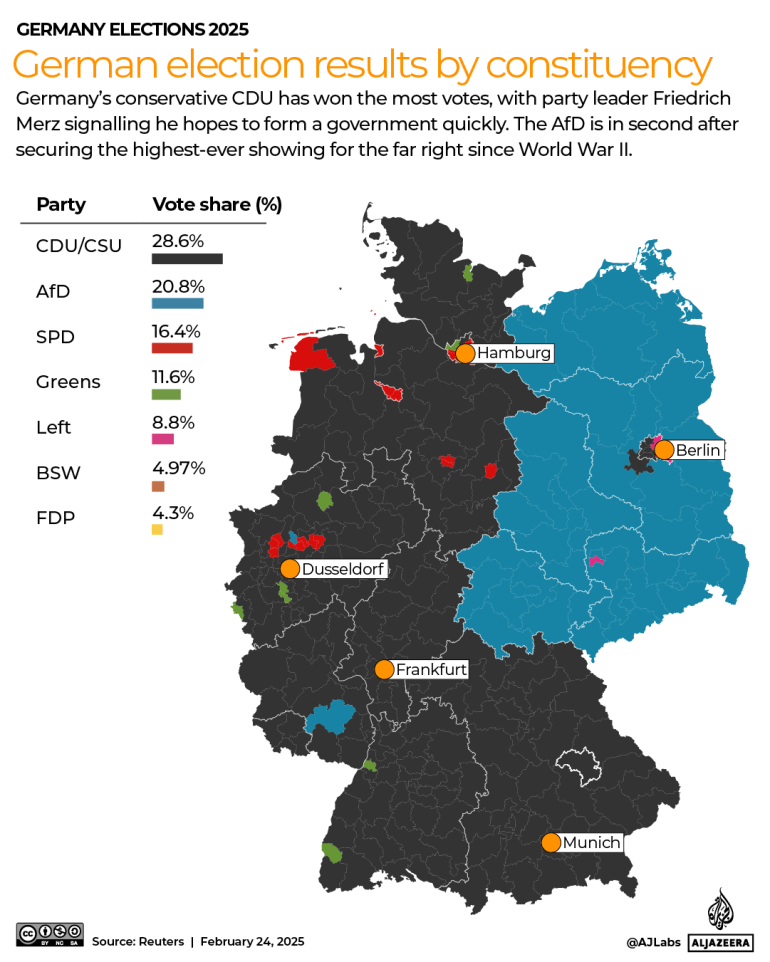Young Germans leaned to the far ends of the political spectrum in Sunday’s election, with most backing Die Linke (The Left) and the far-right Alternative fur Deutschland (AfD), or Alternative for Germany.
While Germany’s Christian Democrat Union (CDU) party secured more than 28 percent of the vote overall, winning the federal election and defeating incumbent Chancellor Olaf Scholz’s Social Democrats (SPD), few young Germans threw their support behind its leader, the 69-year-old Friedrich Merz.
The AfD came in second overall, with 20 percent, the biggest result for a right-wing party since the Second World War. Popular with young people, the Left received an 8.7%, which is an unexpected success given earlier polls had predicted a smaller backer pool.
The stakes were high. A record-breaking 83.5 percent of people cast their votes, the highest turnout since German unification in 1990.
Merz is likely to become chancellor, but is set to inherit a divided nation that is split over immigration, a weak economy, and ideological differences.
Here’s what we know about how young Germans voted in the election:
What are the current findings regarding young people’s voting habits?
Die Linke won over young Germans. The party secured 25 percent of the votes among 18- to 24-year-olds – the highest among all parties and a rise of 17 points from the 2021 federal election result, according to an exit poll conducted by Infratest Dimap, a major German psephology firm, for ARD, the German public broadcaster.
The AfD, seen as the biggest election-night winner after coming in second and doubling its vote share from the 2021 result, focused on harsher immigration policies, the economy, and its Russia-friendly position, which drew in more voters. The far-right party won about 21 percent of the vote, up 14 points from 2021, among those 18 to 24 years of age.
The CDU and Christian Social Union centre-right bloc won the election, securing 208 seats out of 630 in the Bundestag. People over the age of 45 provided the majority of its support. On the contrary, only 13 percent of those aged 18 to 24 voted for the conservatives.
The party will need to form a coalition to acquiesce to the minimum number of seats needed to form a government because it lacks an absolute majority.
Since World War II, the center-left SPD’s performance has been dismal. Scholz announced his resignation as party leader, but Merz is looking to find potential coalition partners to keep the SPD in power. Twelve percent of voters aged 18 to 24 backed the SPD, down from 15 percent in the 2021 federal election.
What do young Germans care about?
Reto Mitteregger, a postdoctoral researcher at the University of Zurich, Switzerland, told Al Jazeera that Die Linke and the AfD, to a “weaker and different extent”, successfully capitalised on the concerns of young Germans during their election campaigns.
According to a 2024 study by Shell Energy, 81 percent of Germans aged between 12 and 25 said they were mostly worried about the war in Ukraine. With 67 percent of the respondents concerned about pollution, followed by 64 percent of those concerned about environmental pollution.
A separate 2024 trend study that surveyed more than 2, 000 young people found that 41 percent of those aged between 14 and 29 were concerned by increased immigration. Additionally, it revealed that concerns about housing, the economy, and poverty were influencing the AfD’s popularity.
Why does the AfD appeal to young Germans?
Mitteregger claimed that the AfD’s anti-immigration agenda is “much more normalized today” because it attracted young male voters.
He claimed that “young voters may not be as intimidated by their agenda as they were four years ago.”
More young men backed the AfD, however, compared with young women, who were more likely to back the left.
Young men are still more likely than older men to support a left-wing party, but they also are significantly more likely than younger women to vote for the AfD. Only 14% of women of the same age did so, according to the study. Although it’s still unclear why these differences exist, opposing viewpoints on gender equality and immigration are more clearly dividing the young than the old, according to Mitteregger.

What is the purpose of Die Linke?
Die Linke, a socialist party, advocates for an “immigration society” where everyone has the same rights and opportunities and no deportations.
We fight for a society where all men and women can lead a self-determined life in peace, dignity, and social security and have the ability to influence social relations in a democratic manner. To achieve this we need a different economic and social system: Democratic socialism”, its manifesto reads.
Vanessa, 22, from Kassel-Hessen, a city in central Germany, told Al Jazeera that she voted for Die Linke because she was “afraid of fascists”, referring to the AfD.
“I’m extremely happy that they have had such success, but I’m not sure what I should think about the future of Germany”, she said.
Die Linke, according to Mitteregger, established a strong social media following, including on platforms like TikTok. Its new leading co-candidate, Heidi Reichinnek, delivered speeches against CDU party leader Merz that went viral.
Even so, Mitteregger found the leftist surge among young voters “somewhat surprising”.
Source: Aljazeera





Leave a Reply